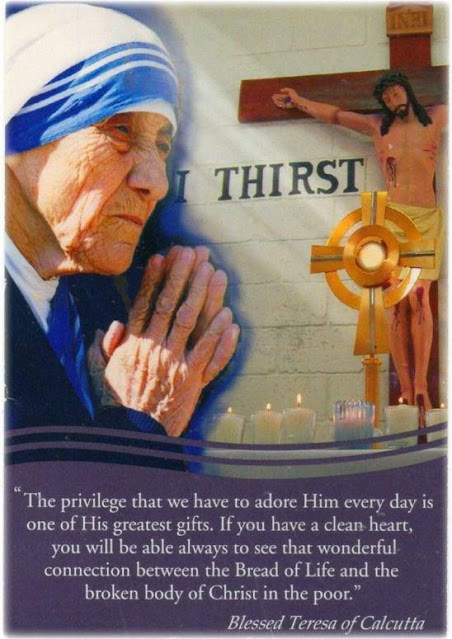Homily for Good Friday, April 2, 2021. Gospel: John 18:1-19:42. Theme: I Thirst
Jesus said, “I thirst.” This cry from Jesus on the cross can be heard and responded to in two different ways, depending upon the relationship we have with Him: as either a Casual Christian or a Committed Christian.
For the Casual Christian, this cry can he heard simply as a line from a story about a crucified man's plea for water after being deprived of it for hours while undergoing abuse and torture. The Casual Christian might feel some pang of sorrow for a moment over the Lord's suffering, but then he or she goes on with his or her life as with any other day.
Or, it can be heard very differently by the Committed Christian. This is someone who hears that Jesus is thirsting and cannot simply stand by idle and do nothing. Their heart is deeply touched, moved to pity, as they stand spiritually at the foot of the cross. The Committed Christian wants to do something, must do something, has to do something, to quench the Lord’s thirst.
This interpretation is not my own, but comes from someone who spent her entire life seeking to quench the thirst of Jesus: St. Mother Teresa of Calcutta. If you go into any residences of the Missionaries of Charity which she started, you’ll notice that their chapels are very sparse and bare. But there’s always a large crucifix on a wall. And under the arms of the cross you’ll see the words, “I Thirst” in very large letters.
Mother Teresa said that those two words, “I thirst”, mean that Jesus thirsts for our love, for the love of each one of us individually, personally. She would often tell people to make this plea of Jesus more real and meaningful by putting their first name in front of those two words, such as, “Teresa. I thirst.” In doing so, she advised, we can better experience what Jesus really means by them and that he is reaching out to each one of us. Put your own name there, she would say, and then realize that He thirsts for your love.
Both Mother Teresa, and St. John in today’s Gospel, are trying to convey to us that you and I are not just faces lost in a crowd of a billion people to Jesus. He died for each one of us personally and would have undergone his entire Passion just for each one of us personally, even if we were the only ones in the world who stood in need of salvation. And so, he thirsts for the love of each and every one of us individually, personally, passionately.
And so, I would think that this should make us stop and ask: How can I today quench the thirst of Jesus on the cross? Well...Mother Teresa had an explanation for this as well!
She first of all reminded us that Jesus is truly risen and really present among us today in two very real ways, but they are ways that require faith to see Him because he is hidden. First, he is present in the Eucharist, the reality of the Blessed Sacrament, hidden under the appearances of bread and wine. And second, He is present in the persons of the poor and the needy, hidden under the distressful disguise of suffering human beings. She used to call these “two different ways but the One Same Jesus”.
Mother Teresa taught that we can quench the thirst of Jesus in the Eucharist by receiving Holy Communion mindfully and worthily, with faith and devotion instead of out of robotic habit and routine. Then, once he is within us we can commune heart to heart, person to person, in a divine romance of the soul. We can tell him of our love; offer him our thanks for all he has done and still does for us; and speak with him about the deepest questions, struggles and desires of our hearts.
And then she spoke of how we can quench the thirst of Jesus in the needy poor by ministering to them in whatever ways we can. She taught us to expand our understanding of what it means to be “poor”, of what it means to “suffer”. We do not need to go to a Third World country or to the worst parts of town to find this presence of the Thirsting Jesus. She told us to remember that loneliness, sadness, ridicule and rejection are all expressions of emotional poverty and human suffering that everyone can encounter in daily life. We can respond to Jesus thirsting right where we are, among those with whom we live, work and socialize and quench his thirst by our patience, our mercy and our compassion.
So, we might want to ask ourselves on this Good Friday afternoon: Do I hear Jesus thirsting deeply for my love? Do I respond to the distressing voice of Jesus crying out, “I thirst” in those around me? Do I want to live as a Casual Christian or as a Committed Christian? In other words, how can I best respond to the thirst of Jesus and show him, by my life and my actions, that I thirst for him, too?

No comments:
Post a Comment